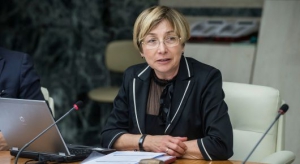FAO’s Serova: 'Now is Asia-Pacific’s turn to defeat hunger and malnutrition’

In the drive to eliminate hunger and malnutrition, the Asia-Pacific region has achieved much and continues to move in the right direction. But to make sure no one is left behind, societies need to take decisive action now. This was the message of Eugenia Serova, head of FAO’s Liaison Office with the Russian Federation, as she addressed the international conference on Food Security in Asia-Pacific here.
Organized by Eurasian Dialog – with support from FAO, Russian Federation’s Ministries of Foreign Affairs and Agriculture, and its Administration of the Far East Region – the all-day event is devoted to observing the current food security situation in the Asia-Pacific region and prospects for sustainable development.
“The Asia-Pacific region achieved the Millennium Development Goal’s hunger target,” said Serova, “but there are disparities among different subregions. In total, about 62 percent about the world’s undernourished – about 490 million people – live in this region.”
Serova said that the challenge is not only to increase food production in the region, but to design policies that ensure a more equitable distribution of food.
“High economic growth has not benefitted everyone equally,” she said.
Serova called attention to emerging challenges for the region that have a bearing on food security:
- coexistence of overweight and obesity with undernourishment
- competition for energy, land and water resources
- climate change
- urbanization
- food waste.
Between 26 and 37 percent of the edible parts of food produced for human consumption is wasted, she said. FAO is leading efforts to sensitize food producers, consumers and others along the food value chain about the problem of food waste.
FAO Director-General Jose’ Graziano da Silva contributed an opinion article to the conference website. Future successes in food production, he wrote, “will require creativity and more research and development. The region has the academic talent to find those solutions, provided governments invest in public goods and create an enabling environment to encourage the private sector to also chip in.”
24 June 2016, Vladivostok, Russian Federation

